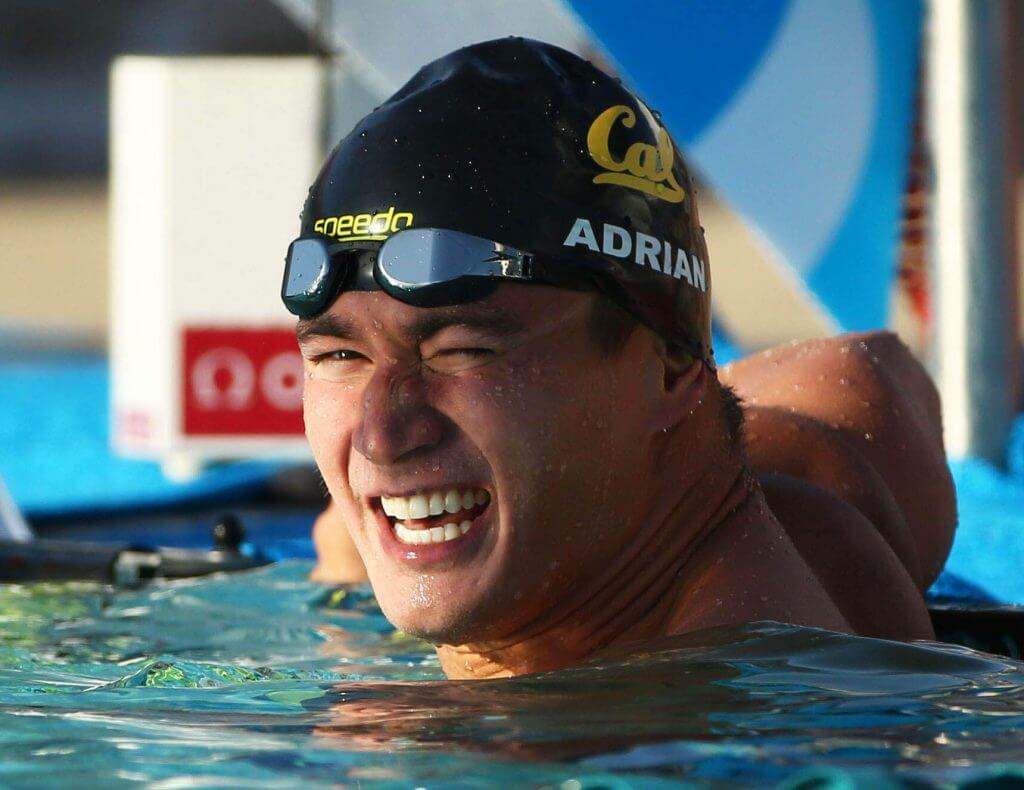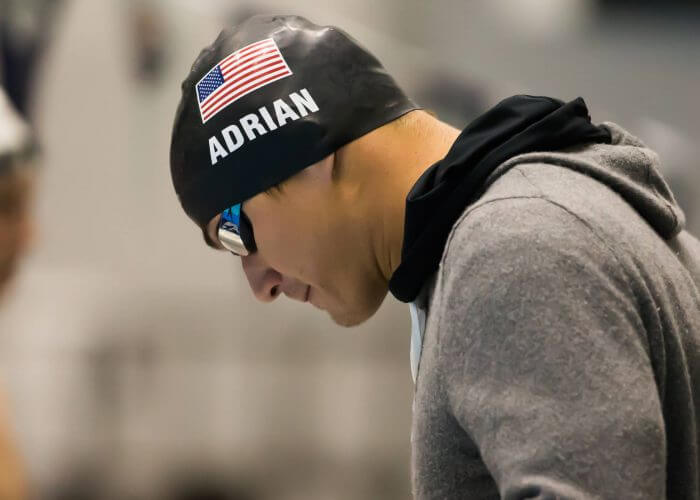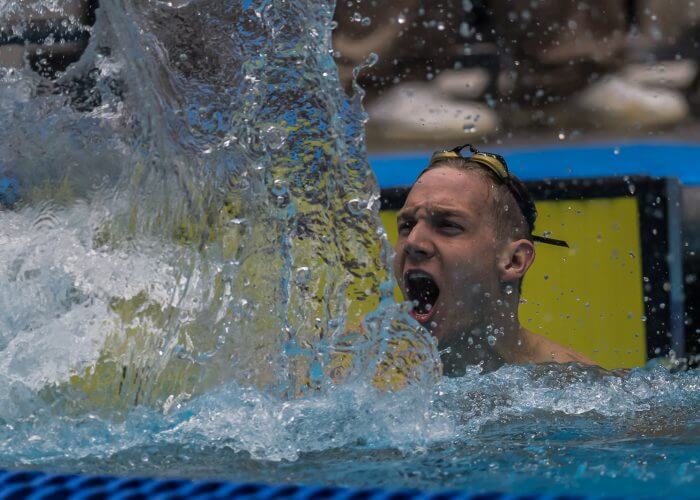Nathan Adrian Pressing On Towards Another Olympic Cycle

Editorial content for the 2017 Arena Pro Swim Series Mesa is sponsored by Arena. Visit ArenaUSA.com for more information on our sponsor. For full Swimming World coverage, check out our event coverage page. CLICK HERE FOR LIVE RESULTS
By David Rieder.
He’s accomplished just about everything one could want in the sport of swimming. And after three Olympics and eight medals, five of them gold, Nathan Adrian has returned to competition for another go-round.
If it seems like Adrian has been around forever, there’s good reason for that. Remember the epic 400 free relay between the U.S. and France in 2008, the one where Jason Lezak split 46.06 on the anchor leg to win gold for the Americans? Well, Adrian was there.
He was not on that finals relay, but he swam in the prelims and thus earned his first gold medal that day in Beijing. He was 19 years old at the time, and he had snuck onto the Olympic team only after winning a swim-off to make the 100 free final at Olympic Trials.
Almost nine years later, Adrian considers that experience in Beijing a formative one.
“I often think back on that. I think I was just very lucky to observe a lot of great swimmers do their thing before I was ready to step on the international stage on an individual level,” he said. “I took different things from different people because emulating one person is not the right way for me, but taking different tidbits from how people approach their races or their training is important.”
After that, Adrian spent the better part of the next eight years as the top sprinter in the country. In 2009, Adrian filled the Lezak role, anchoring the gold medal-winning 400 free relay team at the World Championships. The next year, he upset world record-holder Cesar Cielo to win the 100 free at the Pan Pacific Championships.
His signature individual accomplishment came in 2012, when he touched out heavily favored James Magnussen for gold in the 100 free by one hundredth of a second.

Photo Courtesy: Melissa Lundie
He did not win any individual golds in 2016, but he did take home individual bronzes in both the 50 and 100 free and anchored American 400 free and medley relays to gold, his reliability on that final leg long since established.
After all that, Adrian could have easily called it quits, his legacy secure as one of the great sprinters in U.S. history. But he didn’t.
Adrian laid low for a while after Rio, but he was back in the racing pool seven months later. He made his competitive return at the Arena Pro Swim Series meet in Indianapolis, where he won the 100 free in 48.66 and tied for first in the 50 free in 22.09.
At this weekend’s Arena Pro meet in Mesa, Adrian went much quicker. He dominated the 100 free and posted a time of 48.18, second in the world for 2017 behind only Cameron McEvoy (47.91)—and ahead of Olympic gold medalist Kyle Chalmers (48.20). It’s one of the quickest in-season times Adrian has ever recorded.
Surely, such a quick time this early in the season must have been a surprise—right?
“Yeah. No. I don’t know,” Adrian said. “I didn’t really go into here with any numbers in mind. This has really been about the feel. We’re slowing down the stroke rate the first 50 and trying to bring it home good. It’s more about executing a race plan.”
He’s had more success over the two-lap freestyle sprint than anyone else over the last decade, but Adrian is not afraid to change things up. Quite the opposite. Typically a front-half burner, he has focused this season on coming home under 25 seconds, particularly after Chalmers finished in 24.44 on his way to Olympic gold.
But Adrian is more than just willing to change. He embraces the experimental aspect of his training with longtime coach Dave Durden, and he actually credits his longevity in that sport in part to Durden’s willingness to innovate.
“I am just really, really happy that Dave is receptive to doing things differently,” Adrian said. “I think it’s really fun. He doesn’t have an ego where he’s like, ‘We have to do it this way,’ and ‘This is how we’re going to be the fastest.’ It’s, ‘Hey Dave, what do you think about this?’”
Few coach-athlete partnerships have lasted so long, and as Durden and Adrian begin their third Olympic cycle working together, the signs have already been positive. Even after his layoff, there’s plenty of reason to believe that Adrian will be at or near the top of his game come U.S. Nationals this summer in Indianapolis.
He’s gotten some attention for his return, and surely that 48-low effort in Mesa will only bring more attention, but he’s been far from the center of the American sprint hype train—a train currently being driven at full speed by Caeleb Dressel.

Photo Courtesy: Peter H. Bick
Of course, that’s well-deserved—the Florida junior just swam a 40.00 in the 100 free at the NCAA championships and posted a 17.86 relay split, both times the fastest in history. He’s poised for another big drop in long course after going under 48 for the first time on his way to the 100 free Olympic final in Rio.
In the stands that night in Indianapolis when Dressel swam his 40.00, Adrian gushed in awe of that effort. Now, with other sprinters like Ryan Held, Blake Pieroni and Michael Chadwick all riding high off their college season, Adrian sees great potential for the U.S. men’s 400 free relay team this summer, a squad he hopes to be a part of.
“It wasn’t too long ago when people were saying, ‘Where’s American sprinting? Where’s American sprinting?’” Adrian pointed out. “But we’re here.”
And if Adrian has his way, he won’t be going away anytime soon. While plenty of his Olympic teammates won’t commit to swimming beyond a year-to-year basis, Adrian shows no hesitation in acknowledging that 2020 is very much in his plans.
But the next Olympics in Tokyo are a long way away, and as much as he wants to excel at the World Championships, Adrian knows that this year he must exercise some patience.
“You really have to calm down a little bit. Last year, I ate, breathed, lived swimming. I had this immense feeling of guilt if I was out doing anything besides recovering on the weekends,” he said.
“For the sake of my mental health and my longevity in the sport, I don’t treat it that way this year. It would be easy to because the Olympics are exciting. You want more, and you want to go to the World Championships, and we want to win that, too. But four years is a long time, so we have to treat this year for what it is.”




.jpg)